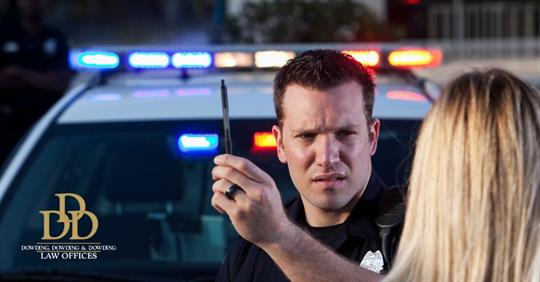As the leaves change and the days grow shorter, Nebraskans are getting ready for a season of fall festivals, football tailgates, and holiday gatherings. While these events are a core part of our community spirit, they also bring an increased focus on impaired driving enforcement, and it’s important for every driver to be prepared.
Law enforcement agencies across the state, including the Nebraska State Patrol and local police departments, usually step up efforts to combat impaired driving. This often includes an increase in the number and frequency of DUI checkpoints. Understanding your rights and responsibilities at a checkpoint is the best way to ensure your safety and protect your legal standing.
What to Know About DUI Checkpoints in Nebraska
A DUI checkpoint, also known as a sobriety checkpoint, is a pre-announced location where law enforcement temporarily stops traffic to check for signs of impaired driving. While these are legal in Nebraska, they must be conducted according to specific guidelines to be constitutional. Officers can't just set up a random roadblock; they must follow a pre-determined, neutral plan for stopping vehicles.
If you encounter a checkpoint, you have certain rights. The key is to remain calm, cooperative, and respectful while also being aware of what you are and are not required to do.
Be Prepared: Have your driver’s license, vehicle registration, and proof of insurance ready to present to the officer. This is a basic requirement, and having your documents organized can make the stop quicker and less stressful.
Politely Decline Field Sobriety Tests: An officer may ask you to perform a series of field sobriety tests, such as the Walk-and-Turn or One-Leg Stand. In Nebraska, these tests are voluntary. You can and should politely decline them. They are often difficult to pass even when sober, and any performance—or lack thereof—can be used as evidence against you.
Know Your Implied Consent: Nebraska has an implied consent law. This means that by driving on our state’s roads, you've already given your "implied consent" to a chemical test (like a breath or blood test) if you are arrested for a DUI. Refusing a post-arrest chemical test can lead to an automatic one-year license revocation, and it can also be used against you in court.
Remain Silent: You have the right to remain silent. The officer may ask you questions like "Have you been drinking tonight?" or "Where are you coming from?" You are not obligated to answer these questions. While you must provide your name and identification, you can politely and calmly state that you choose to exercise your right to remain silent. Do not lie or provide false information.
The Consequences of a DUI in Nebraska
The penalties for a DUI in Nebraska are severe and can have lasting impacts on your life. Even a first-time offense can result in jail time, significant fines, license suspension, mandatory alcohol assessment and treatment, and the installation of an ignition interlock device on your vehicle. An aggravated DUI, which can be charged if your blood alcohol concentration (BAC) is .15% or higher, comes with even harsher penalties.
Beyond the legal ramifications, a DUI conviction can affect your career, insurance rates, and personal reputation. It's a situation that no one should face alone.
Your Partner in Navigating the Legal System
A DUI charge is not just a traffic ticket; it's a serious criminal offense with complex legal implications. If you or a loved one is stopped at a checkpoint and arrested for a DUI, understanding the nuanced legal process is critical. Dowding, Dowding, & Dowding can challenge the legality of the stop, the evidence collected, and ensure your rights were protected at every step.
If you find yourself in this situation, you need a trustworthy and compassionate team on your side. For dedicated defense and professional guidance, contact us at (308) 300-4172 for a confidential consultation.

